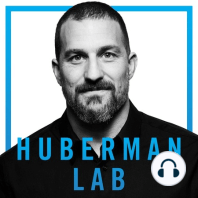85 min listen
Understanding & Controlling Aggression
FromHuberman Lab
ratings:
Length:
88 minutes
Released:
May 9, 2022
Format:
Podcast episode
Description
This episode I describe the neural mechanisms that activate and control aggressive states and beahviors and the role of hormones—estrogen and testosterone—in mediating violent and and/or competive aggression. I also describe tools that can be used to modulate the factors that have been shown to ‘prime’ an individual for aggression, including sunlight, estrogen sensitivity, competition within social settings, and overall stress levels, and the hormone cortisol. I discuss how substances such as caffeine and alcohol can impact impulsive behaviors, and how nutrition and supplementation can be used to regulate mood and aggression.
Thank you to our sponsors
AG1 (Athletic Greens): https://athleticgreens.com/huberman
ROKA: https://www.roka.com -- code: huberman
Helix Sleep: https://www.helixsleep.com/huberman
See Andrew Huberman Live: The Brain Body Contract
https://hubermanlab.com/tour
Our Patreon page
https://www.patreon.com/andrewhuberman
Supplements from Momentous
https://www.livemomentous.com/huberman.
For the full show notes, visit hubermanlab.com.
Timestamps
(00:00:00) Aggression, Types of Aggression
(00:03:33) AG1 (Athletic Greens), ROKA, Helix Sleep
(00:08:29) Neural Circuits for Aggression, “Hydraulic Pressure Model”
(00:15:50) Brain Regions Controlling Aggression, Ventromedial Hypothalamus (VMH)
(00:22:14) Psychiatric Disorders & Aggression
(00:23:36) Stimulation of the VMH, Estrogen Receptors & Aggression
(00:31:57) Neural Circuits Mediating Physical Acts of Aggression, Biting
(0:35:56) Testosterone & Competitiveness/Estrogen & Aggression
(00:43:00) Sunlight, Melatonin & Aggression
(00:45:46) Cortisol, Serotonin & Aggressive Behaviors
(00:51:56) Tool: Omega-3 Supplementation & Mood
(00:54:18) Tool: Sunlight, Sauna & Cortisol Reduction
(00:55:54) Tool: Ashwagandha & Cortisol Reduction
(00:57:06) Tool: Seasonality/Sunlight, Genetic Variation in Estrogen Sensitivity
(01:00:37) Testosterone & Aggression, Competitive Work Environments
(01:05:07) Testosterone, Amygdala, Challenge & Effort
(01:09:27) Caffeine, Alcohol & Impulsivity
(01:13:15) Tool: Caffeinated Alcohol Beverages, Impulsivity & Aggression
(01:17:18) Tool: ADHD, Acetyl-L Carnitine & Aggressive Behavior
(01:24:10) Factors Affecting the “Hydraulic Pressure Model” of Aggression
(01:25:44) Book by Dr. David Anderson, Aggression & Social Relationships
(01:27:35) Zero-Cost Support, YouTube Feedback, Spotify & Apple Reviews, Sponsors, Patreon, Momentous Supplements, Neural Network Newsletter, Instagram, Twitter
Title Card Photo Credit: Mike Blabac
Disclaimer
Thank you to our sponsors
AG1 (Athletic Greens): https://athleticgreens.com/huberman
ROKA: https://www.roka.com -- code: huberman
Helix Sleep: https://www.helixsleep.com/huberman
See Andrew Huberman Live: The Brain Body Contract
https://hubermanlab.com/tour
Our Patreon page
https://www.patreon.com/andrewhuberman
Supplements from Momentous
https://www.livemomentous.com/huberman.
For the full show notes, visit hubermanlab.com.
Timestamps
(00:00:00) Aggression, Types of Aggression
(00:03:33) AG1 (Athletic Greens), ROKA, Helix Sleep
(00:08:29) Neural Circuits for Aggression, “Hydraulic Pressure Model”
(00:15:50) Brain Regions Controlling Aggression, Ventromedial Hypothalamus (VMH)
(00:22:14) Psychiatric Disorders & Aggression
(00:23:36) Stimulation of the VMH, Estrogen Receptors & Aggression
(00:31:57) Neural Circuits Mediating Physical Acts of Aggression, Biting
(0:35:56) Testosterone & Competitiveness/Estrogen & Aggression
(00:43:00) Sunlight, Melatonin & Aggression
(00:45:46) Cortisol, Serotonin & Aggressive Behaviors
(00:51:56) Tool: Omega-3 Supplementation & Mood
(00:54:18) Tool: Sunlight, Sauna & Cortisol Reduction
(00:55:54) Tool: Ashwagandha & Cortisol Reduction
(00:57:06) Tool: Seasonality/Sunlight, Genetic Variation in Estrogen Sensitivity
(01:00:37) Testosterone & Aggression, Competitive Work Environments
(01:05:07) Testosterone, Amygdala, Challenge & Effort
(01:09:27) Caffeine, Alcohol & Impulsivity
(01:13:15) Tool: Caffeinated Alcohol Beverages, Impulsivity & Aggression
(01:17:18) Tool: ADHD, Acetyl-L Carnitine & Aggressive Behavior
(01:24:10) Factors Affecting the “Hydraulic Pressure Model” of Aggression
(01:25:44) Book by Dr. David Anderson, Aggression & Social Relationships
(01:27:35) Zero-Cost Support, YouTube Feedback, Spotify & Apple Reviews, Sponsors, Patreon, Momentous Supplements, Neural Network Newsletter, Instagram, Twitter
Title Card Photo Credit: Mike Blabac
Disclaimer
Released:
May 9, 2022
Format:
Podcast episode
Titles in the series (100)
How to Learn Faster by Using Failures, Movement & Balance | Episode 7: In this episode I discuss how we can use specific types of behavior to change our brain, both for sake of learning the movements themselves and for allowing us to learn non-movement based information as well. I describe the key role that errors plays... by Huberman Lab
